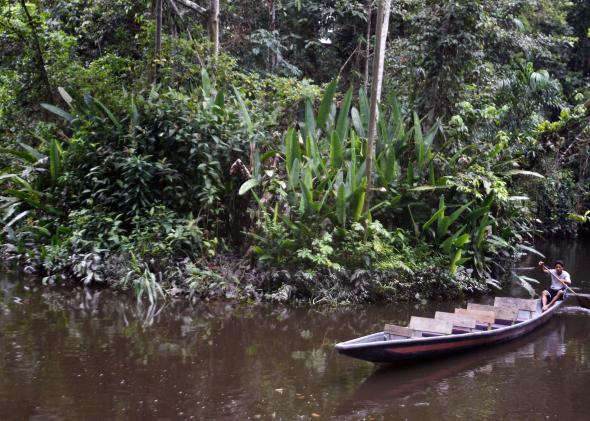Bloomberg’s Alex Morales sums up one of the major takeaways of the latest Intergovernmental Panel on Climate Change report:
About 531 billion metric tons of carbon have been emitted by burning oil, coal and gas, cutting down forests and making cement since 1750, the UN said today. Capping greenhouse gas output at 840 billion tons gives a 50 percent chance of meeting the UN target of restraining warming below 2 degrees Celsius (3.6 degrees Fahrenheit), it said in its first such estimate.
Writing at New Scientist, Michael Le Page has a blunter summation: “Here, in 10 words, is the bottom line: we have to leave most fossil fuels in the ground. It really is that simple.”
In light of this, it’s worth revisiting one of the more interesting schemes for doing this in recent years.
In 2010 Ecuador asked developed countries for $3.6 billion in exchange for not digging for oil in the pristine—but petroleum-rich—Yasuni rainforest. Essentially donors were asked to buy “Amazon bonds,” as part of a plan overseen by the United Nations.
The plan never really gathered much traction, garnering only small donations from a few European countries. In August, President Rafael Correa suspended it, opening up the possibility of drilling in one of the world’s most biodiverse regions, not to mention the resulting carbon emissions from all that oil.
The plan was always a tough sell, politically. Putting aside the other problems the United States and other major economic powers have with Correa’s left-wing government, asking for money not to do something always seems a bit like blackmail to the person being asked. As one U.S. official put it, Ecuador was essentially telling the world, “Give me the money or I’ll shoot the trees.”
Yes, accountability would be a concert and donors would likely want assurances that future Ecuadorean governments wouldn’t simply up the price for not drilling, but the issue here is a real one. If developing countries are being asked to give up a potentially lucrative source of revenue for the greater good of the international community, is it unreasonable to expect the international community to pitch in?
A paper published last year by Northwestern University’s Bard Harstad (via Brad Plumer of Wonkblog) made the case that simply buying the fossil fuel deposits of developing countries in order to leave them in the ground—essentially paying them not to drill—would be relatively cost-effective compared with other methods of combating climate change. (For what it’s worth, Ecuador was asking for about half of what the oil under Yasuni was estimated to be worth at the time.)
The Ecuadorean plan wasn’t presented very well, and Correa might not have been the best leader to sell it to skeptical donor governments, but in light of the new data, it may yet prove to have been an idea ahead of its time.
